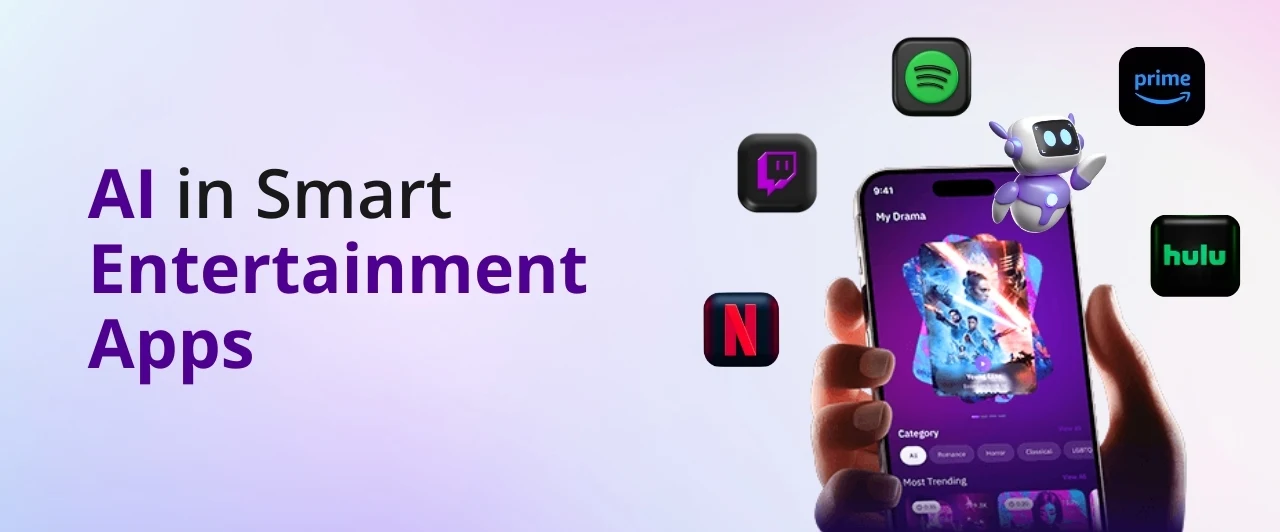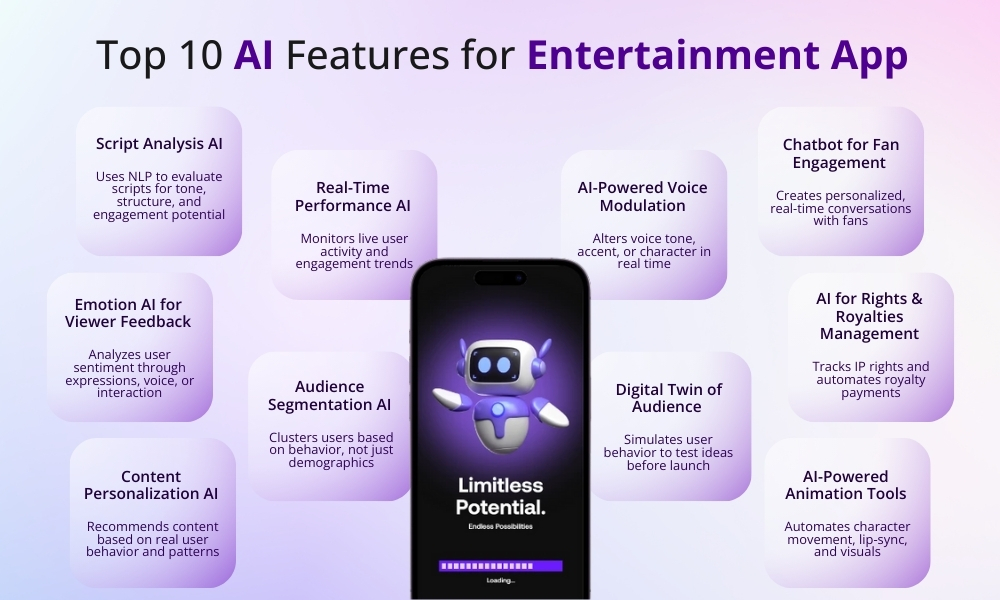- Surfacing binge-worthy shows based on mood + time of day
- Auto-adapting recommendations across devices
- Suggesting content before the user even searches



Open your favorite entertainment app. You didn’t pick that show, it picked you.
Or at least, the system behind it did.
Whether it’s a streaming platform, an interactive story app, or a mobile game, the line between viewer and algorithm has officially blurred. And that’s not hype, it’s happening right now.
According to McKinsey, over 80% of U.S. consumers expect personalized experiences from their digital entertainment platforms. In response, studios, streamers, and game developers are turning to AI—not just to optimize content, but to rewire how it’s made, tested, and delivered.
This isn’t about “using AI” in some abstract, futuristic way. It’s about real features already powering the biggest titles and the quiet race among platforms to build them faster and better. The ones doing it well? They're working with mobile app development companies that specialize in entertainment logic, not just code. They're rolling out AI in games that adapts on the fly. They're treating AI like an infrastructure layer, not a side experiment.
In this piece, we’re not listing tools, we’re unpacking the shift. Each section explores one of the top AI features for entertainment apps, what it actually does, and why it matters for anyone building in today’s market.
AI in entertainment isn’t about the future,
it’s already threaded into the apps we open daily. But most of its impact happens quietly, behind the screen. What separates the most addictive, high-performing platforms from the forgettable ones isn’t just content or UX. It’s how intelligently AI is working under the hood i.e. from shaping stories to sensing moods, from optimizing voice to automating fan interaction.
So what exactly is being built into these apps?
Here are 10 AI features that are quietly transforming how entertainment platforms are developed, scaled, and experienced especially in the fast-moving U.S. market.
This feature analyzes real user behavior—what they watch, when they pause, what they revisit to deliver content recommendations that feel intuitive, timely, and deeply personal.
This is the AI that tailors the user experience around real behavior—not broad categories. In the U.S. market especially, personalization now drives retention, not just engagement.
Netflix, Hulu, Spotify, TikTok
➡️ You’re seeing user churn after onboarding
➡️ Your content catalog is strong but underutilized
➡️ You want users to feel like your app “just gets them”
The most effective personalization engines are baked into the UX flow from day one.
By analyzing facial expressions, voice cues, or interaction patterns, Emotion AI helps entertainment apps understand how users actually feel during content experiences—offering insight that goes far beyond click-through rates.
Traditional analytics tell you what users did. Emotion AI tells you how they felt. This is especially powerful in the U.S. market, where audience sentiment often drives content success or failure before the numbers catch up.
Amazon Prime (X-Ray Labs), interactive video platforms, testing tools for trailers and pilots
➡️ You’re testing new formats or interactive content
➡️ You want deeper UX feedback than just skip rates
➡️ You’re building features that respond to mood or tone
Emotion AI adds serious value during prototyping and iteration—especially when paired with user segmentation.
This feature uses natural language processing to analyze screenplays, scripts, and dialogue for tone, pacing, structure, and emotional impact—helping creators refine content before a single frame is shot.
In a high-risk industry where budgets are tight and audience tolerance is even tighter, AI-powered script analysis can flag weak plot points, predict audience reactions, and even surface structural issues before production begins.
WriterDuet (via plugins), internal tools at Netflix & Amazon Studios, script testing platforms
➡️ You’re developing original content for a streaming app
➡️ You want to reduce creative risk and development time
➡️ Your app includes storytelling, narrative games, or interactive episodes
Script intelligence is becoming a standard pre-production tool—especially for platforms creating or licensing exclusive content.
This feature clusters users based on real behavior, preferences, and engagement patterns—giving you a far more dynamic and actionable understanding of your audience than traditional demographics ever could.
In today’s fragmented entertainment landscape, success comes from speaking directly to micro-audiences, not broadcasting to everyone. AI-driven segmentation helps apps deliver the right content, messages, and experiences to the right users at the right time.
Disney+, Hulu, and marketing backends used by mobile gaming platforms and OTT services
➡️ Your user base is growing, but engagement feels inconsistent
➡️ You want to test different content strategies for different user types
➡️ Your app supports multiple genres, moods, or formats
Real segmentation leads to real personalization. It's one of the most underused yet high-impact tools in entertainment app development.
This feature monitors user activity as it happens such as tracking engagement, drop-off points, lag spikes, and interaction trends that helps teams respond instantly and improve the live experience on the fly.
When your content is live, there’s no room for guesswork. Real-time AI insights help you see exactly what’s working (and what’s losing users) so you can adjust in the moment—not after it’s too late.
Twitch, YouTube Live, major sports streaming platforms, live mobile game events
➡️ You’re launching live or timed content in your app
➡️ You want to track audience reactions minute by minute
➡️ Your app needs to scale smoothly with unpredictable traffic
Real-time AI lets you turn passive metrics into active strategy. It’s the difference between reacting and responding.
This feature transforms recorded or live voices in real time—changing tone, gender, accent, age, or emotion—without requiring additional voice actors or re-recording.
Whether you're localizing for new markets, creating fictional characters, or experimenting with interactive voice content, AI voice modulation gives creators more control, flexibility, and speed without sacrificing quality.
Voicemod, Replica Studios, game and podcast platforms using synthetic voice APIs
➡️ You’re producing multilingual or global content
➡️ Your app features virtual characters, hosts, or voice-driven UI
➡️ You want to iterate on voice delivery without re-recording
Voice is the next UX surface. Modulation unlocks new levels of accessibility, creativity, and speed in voice-heavy apps.
This feature creates a data-driven simulation of your audience, allowing you to predict how real users might respond to content, features, or updates—before launch.
Instead of waiting for post-release data, digital twins let teams test scenarios in advance. You can forecast audience reactions, spot weak points, and tailor experiences without trial-and-error in the real world.
Used internally by Netflix, gaming studios, and research-driven OTT platforms
➡️ You’re releasing high-stakes features or original content
➡️ You need insight into behavior before launch
➡️ You want to reduce the risk of rolling out to the wrong audience
Digital twins take audience modeling from theory to application. It’s like A/B testing the future.
This feature accelerates the animation process by generating character movement, lip-sync, background design, and even full scenes—dramatically reducing production time and cost.
Animation is traditionally slow, expensive, and labor-intensive. AI tools shift that by handling repetitive or technical tasks, letting creative teams focus on storytelling and design instead of time-consuming manual work.
Built into apps like
Runway, NVIDIA Omniverse, tools used by indie game studios and YouTube creators
When to consider it
➡️ You’re building animation-heavy content like games, web series, or explainer videos
➡️ Your team needs to produce high-volume visuals at scale
➡️ You want to empower creators without large production overhead
AI levels the animation field—giving small teams the power to produce like studios.
This feature automates the tracking, validation, and distribution of rights and royalty payments—ensuring content owners, creators, and distributors are paid accurately and on time.
In the U.S. entertainment industry, licensing deals are complex—and errors are expensive. AI helps platforms manage contracts, usage rights, and payment flows in real time, reducing legal risk and operational chaos.
Built into apps like
Major music streaming platforms, OTT backends, and publishing tools like Stem or Revelator
➡️ You’re distributing licensed or user-generated content
➡️ Your platform includes monetized assets (music, video, games)
➡️ You want to reduce overhead on finance and legal workflows
Royalty and rights logic should live inside the platform—not off to the side in spreadsheets.
This feature enables real-time, conversational interactions between fans and your platform—answering questions, recommending content, and creating moments that feel personal, not automated.
Today’s fans expect more than content—they expect connection. AI-powered chatbots help entertainment apps build stickier, more dynamic relationships with users, turning casual viewers into loyal communities.
Built into apps like
TikTok Live, Twitch extensions, sports and streaming fan engagement tools
➡️ You’re launching events, exclusives, or interactive content
➡️ You want to keep users engaged between releases
➡️ Your brand is building a fan community—not just an audience
The smartest chatbots aren’t just responsive—they’re emotionally aware, on-brand, and fully integrated into the content experience.


Entertainment apps aren't just about content anymore. They're powered by AI, with features like real-time performance tracking and digital twins shaping the future of app experiences.
AI isn’t just a trend in entertainment app development, it’s the competitive edge.
From personalized content and audience segmentation to real-time performance tracking and AI-powered animation, these tools are redefining how entertainment experiences are built, delivered, and monetized. Whether you're developing a streaming platform, a narrative-driven mobile game, or a hybrid media app, these AI features including advanced AI in games are no longer optional, they're essential.
The most successful platforms in the U.S. are already weaving this tech into their pipelines early, working with partners who understand both mobile app development services and the behavioral patterns that drive audience engagement. If you’re still treating AI as an afterthought, you’re not just behind—you’re invisible.
We help brands turn strategy into product—integrating AI features into entertainment and gaming apps, including cutting-edge applications of AI in games.
Looking for a partner with deep experience in mobile app development, AI, and media tech?
Book a call today!
Are You Prepared for Digital Transformation?
AI Development
From GPT-5.3 to Claude Opus 4.6, February 2026 delivered real-world AI breakthroughs. Catch up on the latest AI news and shifts redefining tech.
Mobile App Development
Looking for profitable mobile app ideas for startups in 2026? Explore trending ideas and hire expert mobile app development services in the USA.
Mobile App Development
How much does Flutter app development cost in the USA in 2026? See real price ranges, app category costs, and US pricing for startups and enterprises.